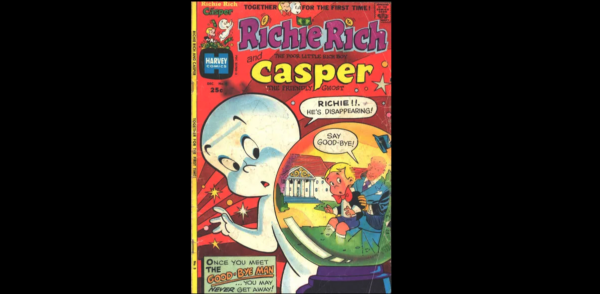
Ralph Newman Newman created stories for beloved characters like Richie Rich and Casper the Friendly Ghost (Photo: GoCollect.com)
World War II Veteran and talented cartoonist, Ralph Newman, will be posthumously honored at San Diego’s Comic-Con International this month for his uncredited contributions to the comic book industry, as reported by the Stars and Stripes.
Newman, who created stories for beloved characters, such as Richie Rich, Casper the Friendly Ghost, Wendy the Good Little Witch, Sad Sack, Little Audrey, and many more will receive the Bill Finger Award for Excellence in Comic Book Writing on July 26. This award recognizes cartoonists whose work, despite its impact, did not receive the recognition it deserved. Comic-Con International, an event that attracts over 130,000 attendees annually, serves as the backdrop for this tribute to Newman.
Mark Evanier, a writer, historian, and administrator for the Bill Finger Award, noted the importance of recognizing overlooked talent in the comic book industry.
“There are many in the history of comics who created legendary characters that generated immense revenue but received little to no acknowledgment,” Evanier said. “[Newman] created hundreds, if not thousands, of comic book stories, many of which were reprinted and even adapted into TV shows. Even well-informed comic scholars often did not know his name.”
Newman, who passed away in 1989 at the age of 75, had a prolific post-war career. He worked at Terrytoons animation studio, Timely Comics (now Marvel), and Harvey Comics, contributing to some of the most iconic comics of the era. Despite his extensive work, he seldom received credit, a common practice at the time. Some of his credited work appeared in Stars and Stripes, the U.S. military newspaper, where he drew for the London edition during 1944 and 1945. His illustrations were published alongside cartoonists like Dave Breger, creator of G.I. Joe, and Bill Mauldin, known for his wartime characters Willie and Joe.
Newman’s daughter, Marilyn Newman, shared with Stars and Stripes insights into her father’s background and aspirations. Ralph Newman attended Albion College in Michigan, where he studied art and journalism before moving to New York City. There, he sold cartoons to publications such as The New Yorker before being drafted into the Army in June 1942. After the war, he left the Army as a corporal, met his wife in London, and eventually settled in Darien, Connecticut, where he maintained a drawing studio at home.
Reflecting on her father’s legacy, Marilyn Newman expressed pride in his achievements and the belated recognition he is receiving.
“I wish he could’ve lived to see this award,” she said. “He made a lot of money for those companies, and he should be acknowledged for it. It’s different times now, and I’m glad people realize that.”
She hopes this recognition will inspire more people to learn about her father’s contributions to the world of comics.












